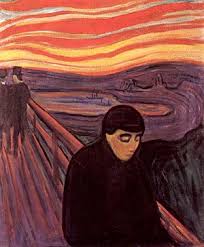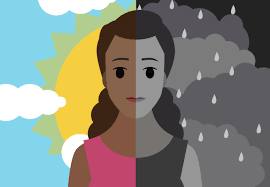Bipolar disorder (BD) and borderline personality disorder (BPD) are two of the most commonly diagnosed mental illnesses. Though they share some common symptoms, there are key differences between the two disorders that it is important to understand. In this blog post, we will discuss the difference between BPD and bipolar disorder, as well as the treatment options available for each condition.
Contents
Defining BPD and Bipolar
 BPD and bipolar are both mental disorders that can cause significant disruptions in a person’s life. They share some symptoms, but there are important differences between the two. It’s important to understand the distinction so that you can get the right diagnosis and treatment.
BPD and bipolar are both mental disorders that can cause significant disruptions in a person’s life. They share some symptoms, but there are important differences between the two. It’s important to understand the distinction so that you can get the right diagnosis and treatment.
BPD, or borderline personality disorder, is a mental disorder characterized by mood swings, impulsive behaviors, and difficulty regulating emotions. People with BPD often have a history of trauma or abuse.
Bipolar disorder is a mental disorder characterized by extreme changes in mood, from highs (mania) to lows (depression). Bipolar disorder can also cause changes in energy levels and behavior.
While both disorders can be debilitating, they are different conditions with different causes, symptoms, and treatments. Here’s a closer look at the key differences between BPD and bipolar disorder.
Relationship Between BPD And Bipolar
There is a relationship between borderline personality disorder and bipolar disorder. People with BPD are more likely to experience symptoms of bipolar disorder than people without BPD. There are a few differences and similarities between the two disorders that are important to understand.
Similarities
The similarities between BPD and bipolar are often obvious due to the manic and depressive episodes. Both disorders are associated with:
- impulsivity,
- risky behavior, and
- a lack of emotional regulation.
Moreover, the similarity between the two disorders often leads to a misdiagnosis of bipolar disorder when the person actually has BPD. The common similar thing between the two is mood changes. It is believed that mood shifts and impulsivity are what link the two disorders.
Also, a person with bipolar is more likely to have a family member with BPD. This suggests that there is a genetic link between the two disorders. Therefore, it is essential to get a proper diagnosis from a mental health professional to ensure you are getting the correct treatment.
Differences
 The key difference between the two disorders is that people with bipolar disorder experience manic episodes, while people with BPD do not. Manic episodes are characterized by:
The key difference between the two disorders is that people with bipolar disorder experience manic episodes, while people with BPD do not. Manic episodes are characterized by:
- a high mood,
- increased energy, and
- decreased need for sleep
People with BPD may experience periods of intense anger, anxiety, or depression. However, these episodes are not as severe as manic episodes.
Bipolar disorder is a chronic condition that requires lifelong treatment. BPD can be treated with medication and/or therapy. Also, bipolar is characterized by extreme highs (mania) and lows (depression). On the other hand, a borderline personality disorder is characterized by instability in moods, relationships, self-image, and behavior.
So, these are the key differences and some similarities between bipolar disorder and borderline personality disorder. It is important to seek professional help if you think you may have either of these disorders. Treatment can make a big difference in the quality of life for people with these conditions.
How To Treat BPD and Bipolar?
There are a number of ways to treat both BPD and bipolar disorder. But it’s important to understand the difference between the two before starting any treatment plan.
Also, the treatment between the two is different. So, here are some outlined treatment options for both conditions individually.
For BPD
Treatment of BPD is done through a combination of medication and therapy. The most common type of therapy used to treat BPD is dialectical behavior therapy or DBT. This type of therapy helps patients learn how to cope with their emotions in a healthy way.
DBT focuses on four key areas:
- mindfulness,
- interpersonal effectiveness,
- distress tolerance, and
- emotion regulation.
DBT is described as a “middle ground” between traditional talk therapy and medication. Also, the aim of this therapy is to help patients become more aware of their thoughts and emotions so they can respond to them in a healthier way.
Another option is medication, as patients with BPD are often prescribed medication to help stabilize their mood. The most common type of medication used to treat BPD is antidepressants. These medications can help reduce symptoms of depression, anxiety, and impulsivity.
For Bipolar Disorder
 Treatment for bipolar disorder usually involves a combination of medication and therapy. The most common type of medication used to treat bipolar disorder is a mood stabilizer.
Treatment for bipolar disorder usually involves a combination of medication and therapy. The most common type of medication used to treat bipolar disorder is a mood stabilizer.
Other medications may be used to help with symptoms such as anxiety or depression. Some of these medications include:
- Antidepressants
- Anti-anxiety medication
- Stimulants
- Antipsychotics
Also, it is important to discuss the potential side effects of the medications with your doctor.
Therapy can also be an important part of treatment for bipolar disorder. It can help people learn to manage their symptoms and understand how to deal with triggers.
There are different types of therapy that can be used to treat bipolar disorder. Some of these include:
- Cognitive-behavioral therapy
- Interpersonal and social rhythm therapy
- Family-focused therapy
- Psychoeducation
- Group therapy
So, with these numerous options of treatment available, it is important to seek professional help in order to find the best option for you. If you or someone you know is struggling with bipolar disorder, don’t hesitate to reach out for help.
Self-Help Strategies for BPD And Bipolar
 It is essential to find some self-help strategies along with professional treatment because both disorders can be debilitating. It is hard to find the line between what is caused by one’s disorder and everyday life stressors.
It is essential to find some self-help strategies along with professional treatment because both disorders can be debilitating. It is hard to find the line between what is caused by one’s disorder and everyday life stressors.
For example, if you are bipolar and your house catches on fire, it would be hard to tell if the anxiety and depression you feel afterward are from the event itself or from your disorder. The following are some self-help strategies that can help you deal with day-to-day stressors:
Create a routine
Routine is everything when you are dealing with a mental illness. It provides structure and stability in an otherwise chaotic world. A routine gives you a sense of control and can help ground you when you are feeling overwhelmed. Also, creating a routine by yourself is empowering and can help boost your self-esteem. In fact, studies have shown that people with mental illness who stick to a routine are more likely to recover and stay well.
Get enough sleep
This is important for everyone, but especially for those with bipolar disorder. Sleep deprivation can trigger manic episodes. In fact, it is believed that one of the main causes of mania is a lack of sleep. Make sure to get at least eight hours of sleep every night. There are also some sleep aids that can help you if you have trouble sleeping. And some relaxation tips to calm your mind before bed. So, if you are feeling particularly stressed, make sure to get some extra rest.
Practice exercise
Exercise releases endorphins, which have mood-boosting properties. It can also help reduce stress and anxiety. For people with bipolar disorder, exercise can be a natural way to stabilize moods. More often, exercise is recommended as a complementary treatment to medication and therapy. Also, exercise is believed to help improve the quality of sleep. So, if you are feeling down, go for a run or take a yoga class. Even just a simple walk around nature will do wonders for your mood.
Eat a balanced diet
What we eat has a direct impact on our mood and energy levels. Eating nutritious foods helps the body function at its best. A balanced diet is especially important for people with bipolar disorder because they are more likely to have nutritional deficiencies. In this, there are so many foods that can help stabilize moods. So, make sure to eat plenty of fruits, vegetables, and whole grains. And limit your intake of processed foods and sugar. Gradually, you will start to feel the difference in your mood and energy levels.
Take breaks during the day
This is often called “self-care.” It is important to take time for yourself every day to do things that make you happy. This can be anything from reading a book, taking a bath, or going for a walk. Also, BPD is a condition that is characterized by impulsivity, so it is important to have some structure in your day. Moreover, breaks are important because they can help you avoid burnout. So, make sure to schedule some “me time” into your day. Otherwise, you will quickly become overwhelmed and that will impact your mood.
Set realistic goals
It can be easy to get overwhelmed when you are trying to accomplish too much. When you are setting goals, make sure they are realistic and attainable. This will help you avoid getting frustrated and discouraged. In fact, it is often recommended that people with bipolar disorder break down their goals into small, manageable steps. Because accomplishing small goals can help boost your self-esteem and give you a sense of accomplishment. This will also help you avoid becoming overwhelmed and stressed.
Find a support
 It is important to find a support system of family and friends who understand your condition and can offer emotional support. It can be helpful to join a bipolar disorder support group. This is a place where you can share your experiences with others who are going through similar things.
It is important to find a support system of family and friends who understand your condition and can offer emotional support. It can be helpful to join a bipolar disorder support group. This is a place where you can share your experiences with others who are going through similar things.
Both bipolar disorder and BPD are serious mental illnesses that require professional treatment. However, there are some self-coping strategies that can help you deal with the day-to-day stressors of these disorders.
In fact, self-care holds more importance for people with BPD because of the impulsivity that is characteristic of the condition. It is important to find a balance between professional treatment and self-care. Therefore, consider adding some of the above strategies into your daily routine.
Conclusion
To conclude, BPD and bipolar are two very different mental disorders. While they may share some similarities, it is important to understand the key differences in order to get the correct diagnosis and treatment plan. If you suspect that you or a loved one may be suffering from either of these disorders, please reach out to a qualified mental health professional for help.
For more information, please contact MantraCare. Bipolar disorder is a mental illness characterized by extreme shifts in mood, energy, and activity levels. If you have any queries regarding Online Bipolar Disorder Counseling experienced therapists at MantraCare can help: Book a trial Bipolar Disorder therapy session


